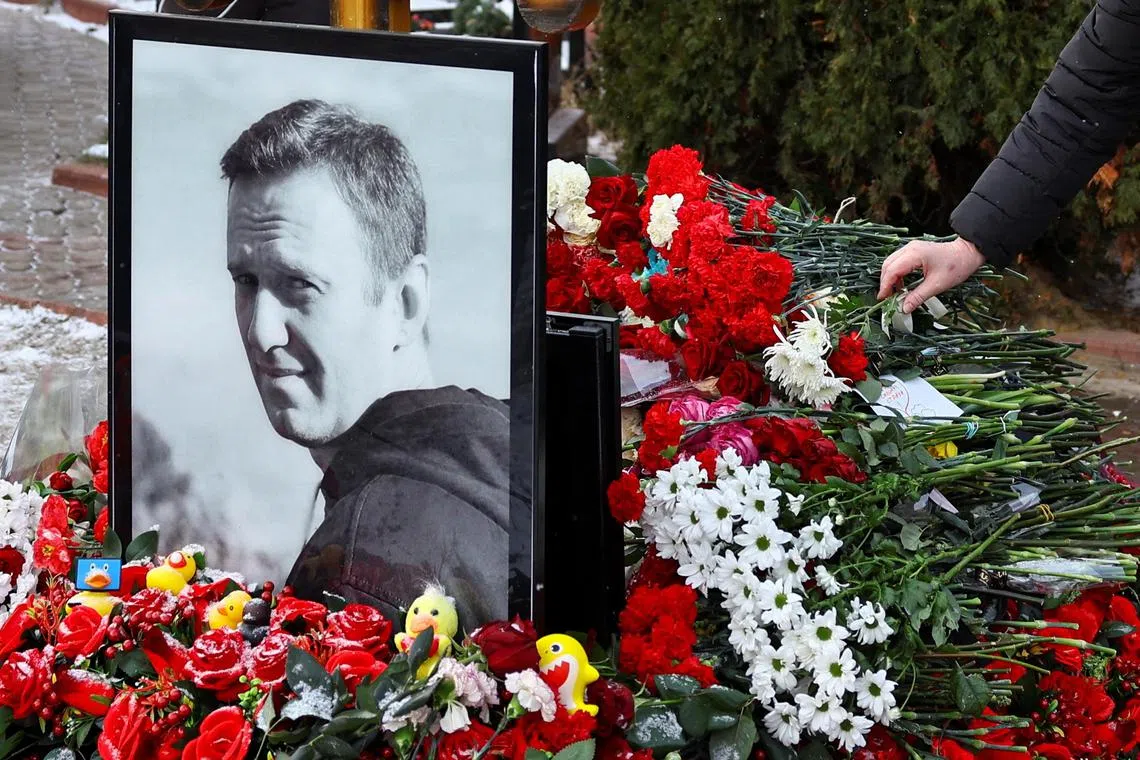Navalny supporters risk reprisals with memorial events a year after his death
Sign up now: Get ST's newsletters delivered to your inbox

A person lays flowers at the grave of Russian opposition leader Alexei Navalny in Moscow on Feb 16.
PHOTO: REUTERS
MOSCOW - A year after Russian opposition leader Alexei Navalny died behind bars
Throughout the morning, people braved glacial temperatures to file past Mr Navalny’s grave in Moscow’s Borisovskoye cemetery, defying warnings that the authorities would be watching them.
Meanwhile, world leaders including German Chancellor Olaf Scholz paid tribute to Navalny’s legacy and decried Russian President Vladimir Putin’s autocratic rule.
Remembrance events were taking place with Russia’s opposition movement – driven into exile by unprecedented repression – still plagued by infighting and badly weakened since the loss of its figurehead.
Exiled in various countries, its leading members have tried to revive the fight against Mr Putin’s long reign, including in Russia, where criticism of the authorities is severely punished.
Mr Navalny – Mr Putin’s main opponent – was declared an “extremist” by Russian authorities, a ruling that remains in force despite his death in an Arctic penal colony on Feb 16, 2024.
In Russia, anybody who mentions Mr Navalny or his Anti-Corruption Foundation without stating that they have been declared “extremist” is subject to fines or up to four years in prison for repeated offences.
Mr Navalny’s widow, Ms Yulia Navalnaya, was set to share memories of her husband at an event in Berlin, where many Russian opposition supporters have settled.
In a video released on Feb 16, she urged supporters to keep fighting for a “free, peaceful and beatiful” Russia.
Mr Navalny’s former top aide Leonid Volkov had urged supporters to mark the occasion in a Telegram post, giving opening hours of the cemetery where Mr Navalny is buried.
‘Big Brother’ warning
But Russian pro-Kremlin Telegram channels warned supporters against going to the cemetery.
“We give brief advice to those who plan to go there but are not yet sure – don’t go!” said a post shared by pro-Kremlin journalist Dmitry Smirnov and other channels.
The message warns of “Big Brother and his ever-watchful eye”, with a photo of a security camera sign at the cemetery gates.
Russia has not fully explained Mr Navalny’s death, which came less than a month before a presidential election that extended Mr Putin’s more than two-decade rule, saying that it had happened as he was walking in the prison yard.
The European Union’s foreign policy chief Kaja Kallas said in a statement on Feb 16 that “President Putin and the Russian authorities bear ultimate responsibility” for the death of Mr Navalny, who “gave his life for a free and democratic Russia”.
German Chancellor Scholz on Feb 16 paid tribute to Mr Navalny, saying on X that “Putin brutally combats freedom and its defenders. Navalny’s work was all the more brave”.
Until his death, the 47-year-old continued to call for Russians to oppose the Kremlin and denounced Moscow’s Ukraine offensive, even from behind bars.
“I took the decision not to be afraid,” he wrote in his autobiography, published after his death in several languages.
Russia has branded Mr Navalny’s Anti-Corruption Foundation and the regional offices he set up as “extremist organisations”.
Participation in an extremist group is punishable by up to six years in prison and many who campaigned in support of Mr Navalny have been jailed or fled the country.
Supporters also risk fines or stints in police cells for publicly displaying “symbols” of an extremist organisation, which has been applied to photos of Mr Navalny or just his name.
Four independent journalists are currently on trial for “participating in an extremist group”, accused of preparing photos and video materials for Mr Navalny’s social media channels.
In January, Russia sentenced to several years in prison three lawyers who defended Mr Navalny on an extremism charge for passing on his messages from prison. The sentence prompted international condemnation.
Ms Kallas on Feb 16 demanded they be released “immediately and unconditionally”.
Call for death probe
Mr Navalny was arrested in 2021 after returning to Russia following medical treatment in Germany for poisoning with the Novichok nerve agent.
In December 2023, he was transferred to a remote penal colony above the Arctic Circle.
Ms Navalnaya has blamed the Kremlin for her husband’s death – which Moscow has denied.
Amnesty International has called for an “independent and impartial investigation” into his death.
Mr Navalny made his name with rousing speeches at huge opposition rallies, becoming the opposition’s most prominent figure.
He faced an avalanche of legal action and received multiple sentences after establishing a network of regional offices and the Anti-Corruption Foundation, which made widely watched videos exposing officials. AFP


